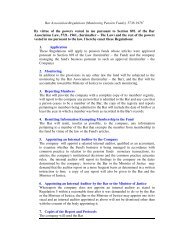AND AN OVERVIEW OF THE ISRAELI COMPANIES LAW AS TO ...
AND AN OVERVIEW OF THE ISRAELI COMPANIES LAW AS TO ...
AND AN OVERVIEW OF THE ISRAELI COMPANIES LAW AS TO ...
Create successful ePaper yourself
Turn your PDF publications into a flip-book with our unique Google optimized e-Paper software.
A PRACTICAL GUIDE<strong><strong>AN</strong>D</strong><strong>AN</strong> <strong>OVERVIEW</strong> <strong>OF</strong> <strong>THE</strong> <strong>ISRAELI</strong> COMP<strong>AN</strong>IES <strong>LAW</strong><strong>AS</strong> <strong>TO</strong> PRIVATELY HELD COMP<strong>AN</strong>IES 1The following article is intended to provide a practical guide and an overview to theIsraeli Companies Law, 1999 as it relates to the establishment and governance oflimited liability companies.A. Background:In the period preceding the declaration of the independence of the State of Israel (in1948), the territory was governed by the British Mandate, hence a strong British,common law influence was manifest in the laws relating to companies in Israel.The companies law underwent a major overhaul in 1999 with the adoption of theCompanies Law-1999 (the "Companies Law"), which adopted many new approachesinto the Law bringing the law closer to the Delaware law of corporations. Some ofthese changes were accepted with favor by the legal and business communities andsome of which, as shall be detailed below, came under sever criticism and were lateramended.Registration of privately held companies, and supervision over the conduct of theiraffairs, fall under the responsibility of the office of the Companies Registrar which isa sub-division of the Ministry of Justice.1 Written by Adv. Meir A. Fuchs, admitted to practice in Israel and the State of New York, Partner,Gideon Koren & Co. - Areas of specialty corporate law, hi-tech, life sciences.This Article is updated as of February, 2010.© Meir Fuchs, Adv. –February 2010.Note: The above should not be considered as legal advice, and can not be relied upon as such.
B. Establishment of a Limited Liability Company:A limited liability company is established by one or more promoters who are requiredto sign and file the following forms:1. Required Filing Information:1.1. An application for the establishment of a new corporation shall includeinformation regarding the names, addresses and identification numbersof the applicant/s; information as to what shall be the registered office ofthe Company; a declaration that the applicant is not limited by any law(debt Execution Law, Bankruptcy Law) from establishing a company; adeclaration as to the aims of the Company; the capital of the Companyand the scope of liability which shall attach to its members.1.2. Unlike some states in the U.S., an Israeli company need not have aregistered agent. Official notices to the Company need to be sent to itsregistered address.1.3. The fees payable for the establishment of an Israeli company do notdepend upon its initially registered capital but are fixed today at a sum of2,435 NIS (linked on an on-going basis to the Consumer Price Index)(approximately $650 as of the date of this article).1.4. The signature upon the documents which are filed for the establishmentof a new company must be authenticated by an Israeli attorney, or ifsigned overseas, by the Israeli consul.1.5. The name of a company must be approved by the Companies Registrar,who may reject a proposed name only on reasonable grounds (acompany, or a trademark, are already registered with such name, or isvery similar to such name; the name is intended to deceive the public, oris contrary to public policy, etc.).2. The Articles of the Company.2
2.1. The Companies Law allows wide latitude in the drafting of the Articlesand only matters which are expressly prohibited or mandated by theCompanies Law need be included or omitted from the Articles.2.2. The general concept underlying the Companies Law is that the Articlesare a contract between the company and its shareholders and a contractamongst the shareholders.2.3. The Articles must include particulars as to the name of the Company, theaims of the company, details as to the registered and initially issued sharecapital and details as to the limitation of liability.2.4. The aims of the Company may be stated to be one of the following: (i)any activity permitted by law; (ii) any activity permitted by law, otherthan the activities set forth in its Articles; (iii) only the activities fixed inits Articles; (iv) public purposes only, and in such a case the Companymay not distribute any profits. The doctrine of ultra vires (beyond legalcapacity) is no longer applicable in Israel.2.5. The capital of the Company may be composed of shares of a certain parvalue, or of shares of no par value, and of only one type of the above (i.e.the Company may not have some shares with par value and somewithout). The Company may have various classes of shares, such aspreferred shares (e.g. with preferential voting, dividend and liquidationrights), management shares (which grant the right to appoint directors),etc. It is to be noted that an increase to the registered capital of acompany has been recently exempted from stamp duty (1%) which usedto be assessed on such increase, thus bringing about significant savingsto companies. Most companies are registered with Ordinary Shareswhich grant their holders an equal right to cast one vote per share in anyshareholder's meeting, to receive a proportionate part of any dividendwhich is distributed and the right to receive a proportionate share of anyassets remaining upon liquidation after all debts to creditors have beensatisfied.3
2.6. There are no limitations as to the maximum holding by foreign residentsof shares in an Israeli company (on the contrary, as shall be presented ina future article there are quite significant tax and government incentivesprovided for companies which have a high rate of foreign holding andwhich are active in one of Israel's approved development zones).2.7. If shares are issued to any foreign residents then, if the proposedshareholder is an individual, a photocopy of his passport must be filed(which may be authenticated, among other ways, by a notary qualifiedto practice in the country where the passport was issued or a notaryqualified to practice in the country of residence of the foreign resident),and if the proposed foreign shareholder is a corporation, then itscertificate of incorporation or registration must be filed, together with acertification as to its existence at such date, both authenticated in themanner fixed in the regulations and translated into Hebrew or English,which translation must be authenticated by a notary.2.8. Liability of the shareholders may be limited by shares, that is to say thatthe liability of the shareholders shall be limited to the sum agreed to bepaid by each of them in consideration for the shares issued to them bythe Company, as countersigned by them in the Articles of the Company.The liability of the shareholders may also be unlimited, as is the case forexample with a professional corporation of lawyers, certified publicaccountants, private investigators and some other types of specialcompanies.2.9. There are no minimum equity investment requirements into an Israelicompany.2.10. A company may decide to file specially drafted articles, or it may decideto merely provide the basic required details as set forth in Section 2.3above, and other than that adopt no other provisions as to its governance.In that case the general provisions of the Companies Law, which arequite comprehensive, shall apply to the governance of the Company,until amended by the shareholders. Examples of provisions which are4
commonly found in the Articles of privately held companies and whichare not included in the Companies Law are the granting of a right of firstrefusal upon the sale of shares by a shareholder, 'tag-along' and 'bringalong'rights and others.2.11. The initial Articles of a company must be filed in Hebrew, although afterestablishment, the Companies Registrar will also accept Articles draftedin English.2.12. Unless otherwise stated in the Articles, the Articles of a Company maybe amended upon a simple majority vote of the shareholders in a generalshareholders assembly. The Articles may also state that certainprovisions shall require a special voting majority in order to be amended.2.13. No amendment may be made to the Articles which would require ashareholder to purchase additional shares, or to increase his liability,absent his approval to such change.2.14. If the capital of the company is divided into various classes, no changemay be made in the Articles as to the rights of such class, without theapproval of a majority of such class, unless it has been fixed otherwise inthe Articles.2.15. The Articles shall be signed by the first shareholder/s and shall indicate,alongside his name, his address, identification number, and the numberof shares allotted to him. The Articles must be signed before an attorney(or Israeli consul abroad) in order to authenticate the identity of thosesigning.3. Consent of Initial Directors:3.1. A third form which must be signed and filed at the time of establishmentof a new company is that of the consent to act by the initial directors.The form must include the particulars of those persons who have agreedto act as the initial directors of the Company. The tenure of the initial5
directors shall end upon the closing of the first shareholders assembly,unless fixed otherwise in the Articles.3.2. A corporation may act a director, while naming the person who shall actas its representative.3.3. A privately held Israeli company must have at least one director.3.4. If it is desired to appoint a non-Israeli resident as a director in an Israelicompany, then, if the proposed director is an individual, a photocopy ofhis passport must be filed (which may be authenticated, among otherways, by a notary qualified to practice in the country where the passportwas issued or a notary qualified to practice in the country of residence ofthe foreign resident), and if the proposed directors is a corporation, thenits certificate of incorporation or registration must be filed, together witha certification as to its existence at such date, both authenticated in themanner fixed in the regulations and translated into Hebrew or English,which translation must be authenticated by a notary.3.5. If the documents are filed properly, then the registration of the newcompany is performed by the Registrar "on the spot". Name changes, ifrequired may also be performed.C. Corporate Governance.4. The general philosophy underlying the Companies Law, is that a company isgoverned by three different organs: the general shareholders assembly; theboard of directors; the general manager and the active management. Theshareholder assembly may be likened to a legislative body, the board ofdirectors to a general policy making and supervisory body and the generalmanager and active management to an executive body.5. The Companies Law creates a system of checks and balances between theorgans. While each organ is autonomous to act in its own sphere, and mustexercise independent discretion as to its obligations, the Companies Law fixesvarious mechanisms allowing one of the organs to supervise the actions of6
another. Thus, the shareholders may dismiss the directors, and the directors maydismiss the general mangers. The shareholders may also amend the Articles andin that fashion change the "rules of the game" altogether.6. The General Shareholders Assembly:6.1. A General Shareholders Assembly (GSA) must be held by the Companyevery year, and in any event no later than 15 months from the last GSA.A privately held company may make a provision in its Articles that itshall not be obligated to hold a GSA, other than for appointing an auditorfor the company.6.2. A director, or any shareholder/s, holding effectively more than 10% ofthe issued capital and/or of the more than 10% voting power of thecompany can compel the Board to convene a GSA.6.3. A notice as to a GSA must be sent to all shareholders at least 7 days priorto the date of the GSA.6.4. A proper quorum for the purposes of holding a GSA requires thepresence, within half an hour of the time fixed for the GSA, of at leasttwo shareholders holding at least 25% of the voting rights in theCompany.6.5. A written resolution of the shareholders may be adopted, provided thatthe resolution is approved by all shareholders who are entitled to vote ata GSA.6.6. Unless the Articles provide otherwise, a GSA may be held by means oftelecommunication, provided that all the shareholders are able to heareach other simultaneously.7. The Board of Directors:7.1. The Board of Directors is charged with setting the general operatingpolicy of the company and with supervising the actions of activemanagement.7
7.2. The Board must furnish a report to the shareholders assembly at itsannual meeting as to the status of the company and of its operatingresults.7.3. The Board is responsible for the preparation of the financial reports ofthe company and of their filing with the responsible authorities.7.4. Advance notice as to a Board meeting shall be given to all the directors areasonable time in advance.7.5. Unless the Articles provide otherwise, a quorum for the purposes ofholding a Board meeting requires the presence of a majority of thedirectors.7.6. Unless the Articles provide otherwise, a written resolution of the Boardmay be adopted, provided that the all the members of the Board, who areentitled to participate in such meeting and vote on the relevant subjecthave agreed not to convene as to such matter.7.7. Unless the Articles provide otherwise, a Board meeting may be held bymeans of telecommunication, provided that all the directors are able tohear each other simultaneously.8. Active Management:8.1. A privately held company, may, but is not required to appoint a generalmanager.8.2. The general manager is appointed and dismissed by the Board.8.3. The general manager is responsible for the daily operations of thecompany, which are to be performed in accordance with the generalpolicy fixed by the Board and subject to its instructions. The generalmanager reports to the Board.9. The Audit Committee.8
9.1. A privately held company, may, but is not required to appoint an auditcommittee.10. Independent Directors.10.1. There is no obligation to appoint independent directors in a privatelyheld company.11. Fiduciary Duties and the Duty of Care.11.1. All officers of the company owe a fiduciary duty and a duty of care tothe company. An "officer" of a company includes the following: (i) adirector; (ii) a general manager; (iii) general business manager; (iv) vicegeneral manager; (v) Assistant general manager; (vi) Any person whofills one of the above roles in the company, even if his title is different;(vi) Any other manager who reports directly to the general manger.11.2. The duty of care is judged by reference to the principles of negligenceenunciated in the Torts Ordinance, and the Companies Law states furtherstates that an "officer" must exercise the same level of competencywhich a reasonable officer would have used in the same position and inthe same circumstances.11.3. The fiduciary duty which is placed upon an officer requires him to act ingood faith and for the good of the company. The basic principle whichmust guide the officer is that he may not use his special position in thecompany in order to make a personal gain or obtain other personaladvantages. The Companies Law does not prohibit the entry of thecompany into transactions with 'interested parties', but places a duty ofdisclosure and fixes a set of approvals which must be obtained for suchtransactions.12. Transactions With 'Interested Parties'.12.1. The provisions of the Companies Law dealing with transactions betweenthe company and "interested parties" are quite extensive and detailed.This article which is limited in scope is not intended to detail all such9
provisions, and we shall therefore describe only the general principles ofsame.12.2. The overriding principle stated in the Companies Law requires anyofficer of the company who knows that he has a personal interest in anytransaction to be concluded with the company, to disclose without delayhis personal interest in same.12.3. Depending upon the nature of the transaction. a transaction between thecompany and an officer must obtain the approval of one or more of thefollowing organs of the company: the board of directors, the auditcommittee (if the company has one) and the general shareholdersassembly. In addition, and foremost, the transaction must be one which isnot to the detriment of the company.13. Pre-Emptive Rights.13.1. The Companies Law mandates that in a privately held company whichhas only one class of issued shares, all the shareholders of a company areentitled to a pre-emptive right to purchase any future issuances of shares,proportionately to their holdings in the Company. The Board of Directorsmay offer to third parties any unsubscribed shares. A company mayhowever, fix different provisions as these issues in its Articles.14. Distribution of Dividends.14.1. A company may distribute dividends out of "profits", provided that:"there does not exist a reasonable concern that the distribution willprevent the company from its ability to meet its existing andexpected obligations, when the time comes for meeting same."14.2. The term "profits" has been defined in the law, and the Board maydistribute a dividend only if a 'profit' exists and only based upon financialreports prepared in accordance with generally accepted accountingprinciples, the effective date of which is no earlier than 6 months prior tothe date of distribution.10
14.3. A dividend distribution which is made not in accordance with the abovestated criteria (a "Prohibited Distribution") may obligate the shareholdersto return funds to the company and furthermore may expose the directorsto personal liability toward creditors.15. Exemption, Insurance and Indemnification.15.1. A company may exempt an officer of the company from liability arisingfrom a breach of his duty of care to the company, if a provision to sucheffect is fixed in advance in the Articles. A company may not exempt anofficer from his fiduciary duty to the company and the acceptance by anofficer of such an undertaking from the company is in itself a breach offiduciary duty.15.2. Two types of indemnification are allowed: before and after the fact. Inorder to provide an undertaking as to indemnification before the fact,such a provision must be included in the Articles of the company. Thistype of indemnification is limited to those instances which in the opinionof the Board can be anticipated in advance at the time of giving theundertakings, and to a sum which the Board fixes as being reasonable inthe circumstances. In order to indemnify an officer post ipso facto, aprovision to this effect must be included in the Articles.15.3. If a company includes an appropriate provision in its Articles, then thecompany may obtain insurance for an officer, in order to insure himagainst liability which may be placed upon him due to actions taken asan office holder of the Company, in any one of the followingcircumstances:15.3.1. The breach of the duty of care toward the company or toward athird person.15.3.2. The breach of the fiduciary duty toward the company, providedthat:15.3.2.1. The officer acted in good faith;11
15.3.2.2. He had a reasonable basis for believing that hisaction will not be to the detriment of the company.15.3.3. A financial liability placed upon an officer in favor of a thirdperson.15.4. A company may also indemnify an office holder for his reasonable legalcosts, provided that the office holder is not accused of a criminal offense,or unless he is acquitted of such offense, or if convicted it is a type ofoffense which does not require scienter. A company may also give anoffice holder an advance undertaking to indemnify him for hisreasonable legal costs, but this too must be set forth in the Articles of theCompany.15.5. No effect shall be given to any provision in the Articles or to anyundertaking as to indemnification as to any one of the following:15.5.1. A breach of fiduciary duty (other than as relating toindemnification and insurance due to a breach of a fiduciaryduty in which the office holder acted in good faith and had areasonable basis for believing that his action will not be to thedetriment of the company);15.5.2. A breach of the duty of care which was performed intentionallyor with carelessness, other than if committed solely negligently;15.5.3. An action taken with an intent to make an illegal personal gain;15.5.4. A fine, or plea-bargain fine placed upon him.16. Reporting Requirements:Privately held Israeli companies are required to file reports with the CompaniesRegistrar as to the following:12
16.1. Amendments to its Articles, including as to the amendment of its name,the increase or decrease of its registered capital. A change to itsregistered address16.2. A notice stating that the company does not have an auditor, if no otherauditor has been appointed in his stead.16.3. Changes made to the board of directors.16.4. The issuance and transfer of shares. (It is important to note that whenstamp duty tax was abolished in Israel the issuance of shares by acompany also became exempt from tax which used to be collected at 1%of the value of the issuance.)16.5. A merger.17. Duty to Appoint an Auditor.17.1. A privately held Israeli company must appoint a certified publicaccountant as an auditor, unless its annual income does not exceed500,000 NIS (amount linked to the C.P.I.) and the shareholders'assembly in a vote of at least 90.1% of the voting power present decidesnot to appoint an auditor.17.2. The auditor is appointed (and may be dismissed) by the GeneralShareholder's Assembly and normally his appointment is effective untilthe next annual general shareholders meeting. The term of theappointment may, subject to certain conditions, be extended byprovisions to that effect in the Articles.18. Financial Reports:A privately held Israel company must prepare annual financial reports toDecember 31 of each year, as well as a balance sheet and a profit and lossstatement, and any other report mandated by generally accepted accountingprinciples. The reports must be audited by a certified public accountant and13
signed by the directors, and must then be brought to the approval of the generalshareholders' assembly.19. The Filing of an Annual Report with the Company's Registrar.19.1. Every privately held company must file an annual report with theCompany's Registrar. Intense debate took place in the Knesset (theIsraeli parliament), as to whether a private company should be requiredto file its balance sheet with Company's Registrar, which would makesuch report accessible to the public, with those opposing such obligationraising the argument that such public filing harms basic rights ofincorporation and privacy. The political comprise that was reached hasresulted in the Law exempting a privately held company from filing itsbalance sheet, unless one of the following exists:19.1.1. The Articles do not place any limitation on the right to transfershares.19.1.2. The Articles do not prohibit the offering of its shares ordebentures to the public.19.1.3. The Articles do not limit the number of its shareholders to 50.As a result of the above, most privately held companies have beenexempted from filing their balance sheet with the Company's Registrar.19.2. The information which does need to filed annually with the Company'sRegistrar is the following:19.2.1. Date of last annual shareholders' assembly.19.2.2. Division of shares and names and particulars of shareholders.19.2.3. Names of acting directors and names of directors who are nolonger acting.19.2.4. Whether or not the company has an auditor and if it does hisparticulars.14
19.2.5. Name and particulars of general manager.The annual report must be signed by the chairman of the board or by a directorwho has been authorized to sign the report.It should be noted that many private Israeli companies fail to adhere to theobligation to file an annual report, although the Companies Registrar has beenempowered by law to assess quite heavy fines against defaulting companies.D. Important Amendments to the Law.In March 2005, a series of amendments were passed to the Law, dealing withvarious technical matters which required correction since the Law was passed in1999, but more importantly revising or deleting some substantive provisionswhich had come under criticism by legal experts and by the courts.We shall summarize below just a few of the most pertinent provisions as theyrelate to privately held companies:20. Lifting the Corporate Veil.20.1. One very major criticism which was leveled against the Law whenenacted was with regard to the extremely strict and interventionistapproach taken by the Law in placing personal liability uponshareholders and even directors and officers, by allowing a court to 'liftthe corporate veil' with relative ease. The effect of this strict approachwas that a multitude of claims were filed with the courts seekingcompensation from shareholders and directors and officers for variousgrievances suffered by the claimants. Apparently foreign residents werealso deterred from serving on the boards of Israeli companies, and in acountry which is highly dependent on investments into hi-techcompanies, and which seeks the personal involvement of foreign expertsin such boardrooms this was a painful result of the Law as enacted.20.2. This was drastically revised. Firstly, the provision allowing the lifting ofthe corporate veil against directors and officers has been deleted (whichdoes not mean however that directors and officers can not be held15
personally liable for breach of fiduciary duties, breach of the duty ofcare, or based on other legal principles applicable to their conduct).20.3. In addition, a court will be allowed to lift the corporate veil only in thefollowing circumstances:20.4. If the court finds that, in the circumstances, it is just and proper to do so,in those exceptional legal circumstances when the use of the separatelegal entity was performed in one of the following:20.4.1. In a manner which would have the effect of defrauding a personor depriving a creditor;20.4.2. In a manner which harms the purpose of the company and whiletaking an unreasonable risk with regard to its ability to settle itsdebts,And, provided that that the shareholder was aware of theaforesaid use, and while taking into consideration the size ofthe holdings of the shareholder in the Company and theperformance of his duties toward the company (duty to act ingood faith and by a controlling shareholder to act with fairness)and while taking consideration the ability of the company tosettle its debts. A shareholder will be deemed as having beenaware, also if he suspected such conduct or the possibility ofthe existence of such circumstances which led to such use, butavoided inquiring as to same, but mere negligence shall notsuffice to place liability upon him.21. The amendment was aimed not only to place additional hurdles in the way oflifting the corporate veil as to all shareholders, but to specifically reduce theexposure of passive shareholders, who are not actively involved in the decisionmaking of the Company, so that they shall not be exposed to personal liabilityfor the actions taken by the Company and/or by its officers or by controllingshareholders.16
22. A shareholder upon whom personal liability is placed will also suffersuspension of any debt owed by the company to him, until the company haspaid off all its other creditors.23. As we can see, after this amendment a claimant seeking to lift the corporate veilwill have to overcome many obstacles before a court will accede to such apetition.17
















